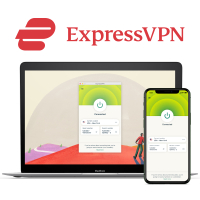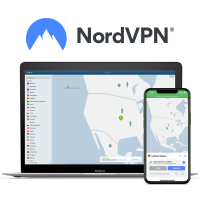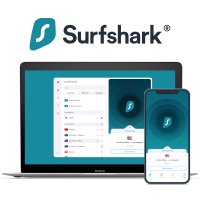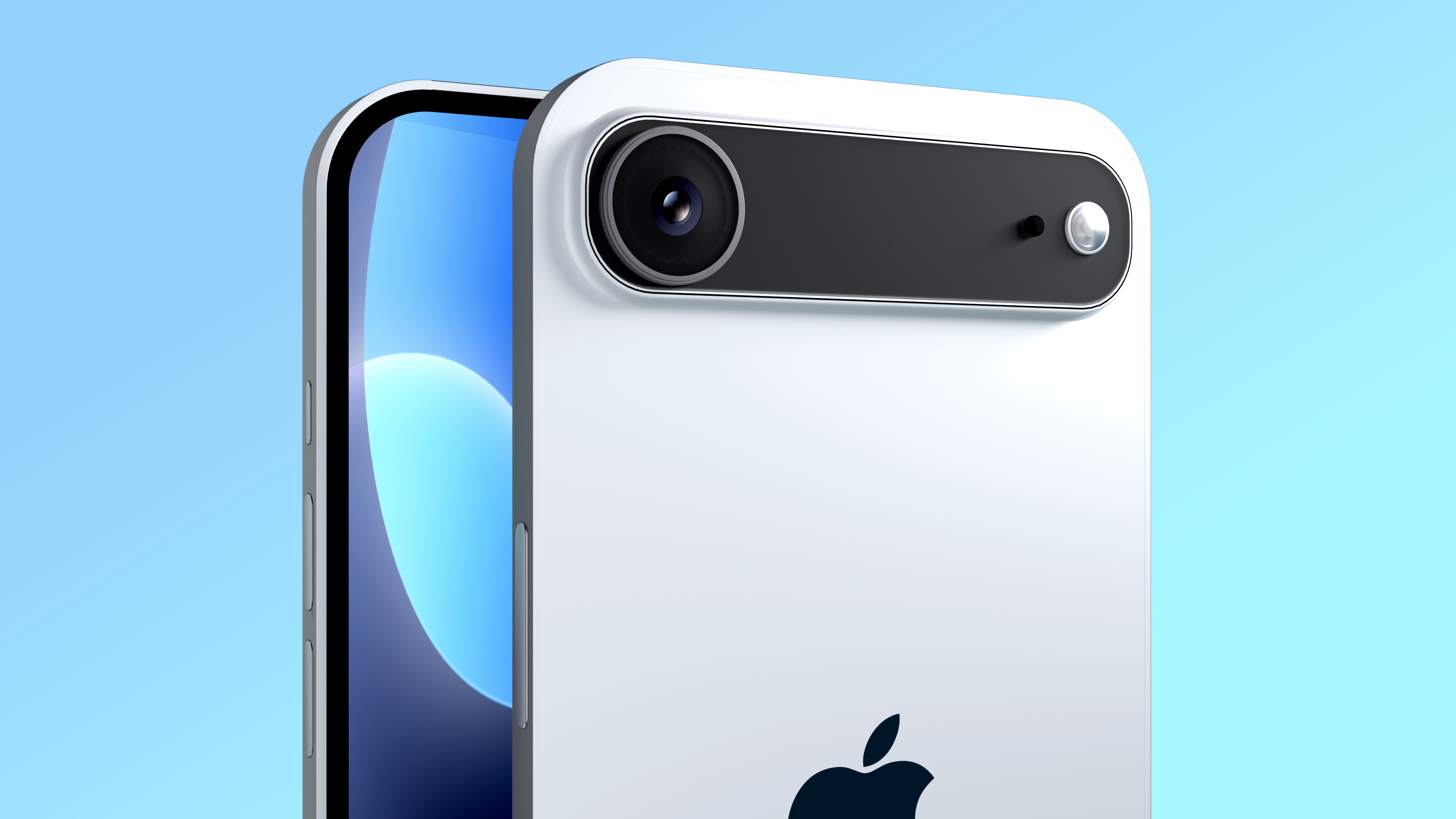How to protect your child on their new PlayStation
Protect your child on their new PlayStation by using a VPN and parental controls.

Gaming’s growing appeal and technological advancements have made it more accessible than ever. With kids beginning to game from an increasingly young age, parents need to be mindful of their safety. Protecting your child's PlayStation is important to ensure their privacy and prevent them from accessing content inappropriate for their age, including M-rated games (meant for 17 or 18+ audiences only) such as Grand Theft Auto V.
While Sony’s built-in parental controls will allow you to limit your child's screen time and how much they're able to spend on in-game purchases, the real cyber threats can be warded off with the help of a VPN.
The best VPN services mask your child's real IP address and replace it with a fake one, ensuring that they're protected from ISP throttling and opponents trying to throw them out of a game by using a DDoS attack or even sending a SWAT team their way.
How to set up parental controls on your child’s new PlayStation
A VPN can undoubtedly safeguard your child while gaming. However, PlayStations also come with built-in parental control features that let you regulate your child’s access to various PS features. Here’s how you can activate parental control on your PS:
1. On the PS home screen, click on the Settings button on the right and choose Parental Control.
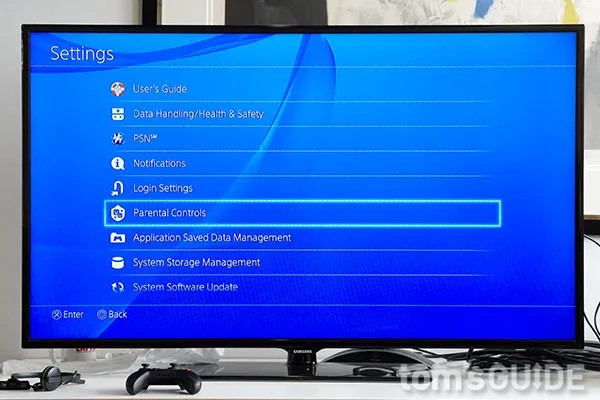
2. You’ll now see two options: Sub Account Management and Restrict Use of PS4 (or PS5) Features.
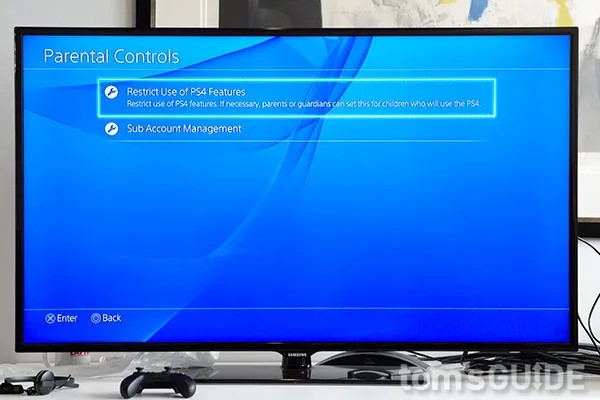
3. Select Sub Account to create a new account. Select the language of your choice, enter your child’s email address, and set a password. Lastly, select the location that you’re in. It’s worth noting that this location should match the one set in your own profile.
Sign up to get the BEST of Tom's Guide direct to your inbox.
Get instant access to breaking news, the hottest reviews, great deals and helpful tips.
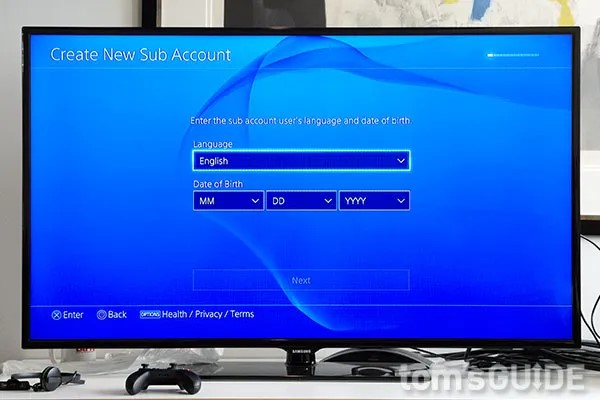
4. Now, you’ll be able to allow and block specific content for your child. You can choose if you want your child to play online, let others use their PlayStation Network (PSN), allow them to download user-generated content, and so on.
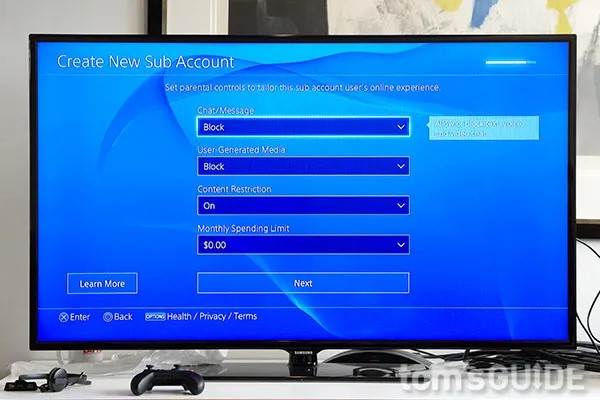
5. Once you’ve made the selections, go back to the Parental Controls menu, where you’ll be able to set the type of content to which you want to give access to your child.
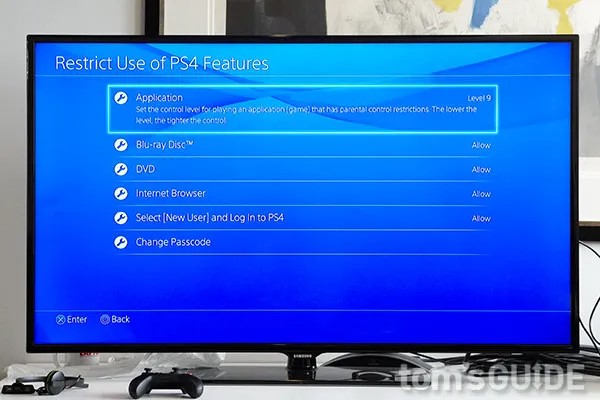
6. There are levels from 1 to 11, based on which you can set different restrictions for your child. For example, Level 2 allows only EC-rated (Early Childhood) games. Level 3 is meant for E (Everyone), Level 4 is for E10+ (Everyone age 10 and up), Level 5 is meant for Teen, and Level 9 allows Mature.
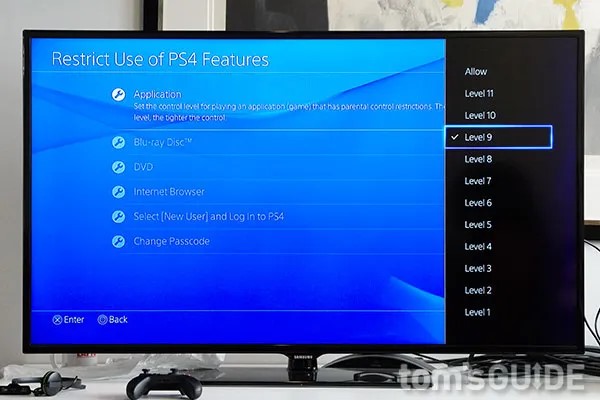
7. Similar levels can be set for Blu-ray discs, DVDs, and internet browsers.
8. In the end, determine if you wish to give your child the freedom to let others log in through their PSN account.
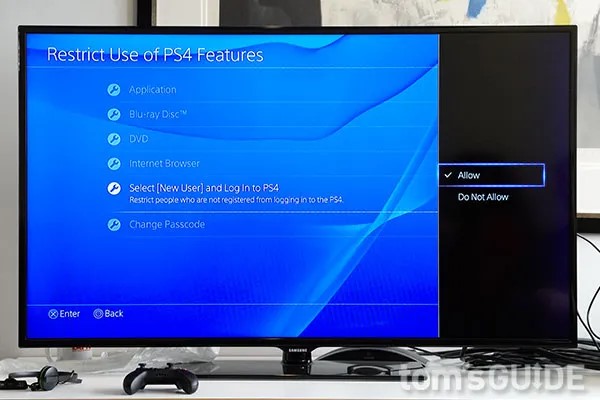
9. If you have multiple kids, just set up similar accounts for all your children, and you’re good to go.
The best VPN for PlayStation in 2023
Using a VPN with your child’s PlayStation will help you keep their data private and protect them from DDoS attacks so that opponents can't throw your child out of a competitive game or trouble them with swatting.
A VPN can also help you steer clear of ISP throttling and ensure that your child enjoys lower ping times and consistently fast speeds. On that note, here are our top picks for the best PlayStation VPNs.
1. ExpressVPN – the best VPN for gaming
ExpressVPN is the best VPN for your child’s PlayStation. It offers an easy-to-use PlayStation app, in-depth guides on setting it up, fast speeds, rock-solid security features, and one of the widest networks of servers in the industry.
It's equally fantastic for streaming and unblocking every streaming platform and international game sales we tested it with. And should you run into any trouble, 24/7 friendly support will help you out as soon as possible. Try it risk-free with a 30-day money-back guarantee, and get 3 months free on the 12-month subscription.
2. NordVPN – the biggest name is super secure
NordVPN, the fastest VPN in our testing, offers a comprehensive security suite for gaming, including a built-in antivirus and Threat Protection with ad and malware blocking. It's also a streaming beast, and it knocked down geo-blocks of whatever we threw at it – even niche locations.
With more servers than rivals ExpressVPN and Surfshark, NordVPN has great coverage, consistently fast speeds, and a perfect quality-cost mix. It also offers a 30-day money-back guarantee, so you can take it out for a test drive before you commit.
3. Surfshark – the best-value VPN on the market
Surfshark is the best budget VPN for gaming, priced at less than $2.50 a month with 3 months of free protection. It comes with unlimited simultaneous connections, incredible streaming support, and class-leading speeds that make it all the more value for money.
With super simple apps and no shortage of tutorials, it's great for beginners as well. Be sure to make the most of its 30-day money-back guarantee to see if it’s the right fit for you.
How to pick a VPN for your child’s new PlayStation
There are many factors to consider when choosing the best PlayStation VPN for your child. Here are the top features to take into consideration in your decision process:
Security: A VPN’s security deliverables are the most important factor when out shopping for a PlayStation VPN. Look into a VPN’s security protocols and the method of encryption they use. Is there support for latest protocols like WireGuard, which is super handy for gaming purposes?
Also, make sure the provider follows a strict no-logs policy (better if they have RAM-only servers) and has adequate measures in place to protect your personal information. Extra security offerings such as multi-hop, port forwarding, a kill switch, and leak protection will come in very handy to protect your child online.
Speed: For a gaming VPN, high speeds and quick refresh rates are non-negotiables. A slight frame drop can ruin your child’s gaming experience. ISPs tend to regulate your speeds during heavy usage, such as gaming. This is known as ISP throttling, and it’ll seriously hamper your gaming powers. A VPN connection can help you evade this, so make sure the VPN provider you choose offers fast speeds with no lags.
Server locations: The higher the number of servers a VPN provider offers, the better its speed and performance. When a VPN has thousands of locations worldwide, it translates into fewer users per server. Plus, if any of its servers go down, there’ll still be plenty others left to take care of the traffic. For gaming, this becomes all the more important as you do not want your game to lag because of an overcrowded server.
Customer support: A good way to gauge the effectiveness of a VPN provider is to check its support mechanism. Do they have several FAQ pages to address your queries? Are there blogs to help you on the fly should you get stuck somewhere? Does the provider have a quick email response time, and is there a live chat feature? Answers in the affirmative point to a reputable and reliable VPN provider.
Price: The best VPN for your needs is the one that’s also in line with your budget. You’ll have to look for a VPN that offers an abundance of features, especially the ones you’re looking for, and all of that at a price tag that doesn’t break the bank for you.
How we test VPNs
Testing out different VPN providers is a time-consuming affair, but given the trust you'll be placing in your VPN, we leave no stone unturned to make sure our VPN testing methodology is rigorous and foolproof so that we recommend nothing but the best VPNs to our readers.
First, we study the provider’s website design — there are a lot of clues there. If a website seems shady, where information is hard to find, there are chances it wouldn’t work as advertised. On the flip side, reputed providers have clean websites with easy access to all the information you need.
Next, we dig deeper into a provider's logging policy. Yes, a lot of providers display huge banners of “no logging” on their platforms, but not all of them are true to what they say on the tin.
We take a close look at how the policy page is designed. Is it filled with technical jargon that’ll make no sense to a layman? Or is it a well-drafted, information-oriented page? We’ve found instances where a provider has copied another platform’s privacy policy and passed it as their own.
VPNs are now undergoing third-party audits to instil confidence in their users, which is certainly a welcome change. However, we make it a point to understand the scope of these audits as well.
Is the audit just for a part of the service, like browser extensions, or for the whole suite of VPN tools? Is the audit report available in the public domain, and what are the essential findings of the audit? We try to find answers to all of these questions before determining the reliability of the audits.
Most importantly, we check a VPN’s performance by subjecting it to real-world tests. We use three speed test sites to run five tests at each site for every VPN provider. Then, we take the median value of all these speeds as our average.
Not only this, but we also check the speeds using various VPN protocols, such as OpenVPN, WireGuard, and others, to establish the fastest protocol a VPN for PlayStation has to offer.
Other core aspects we test the VPNs on include their ease of use (across the board with all of their apps), features on offer, and how value for money they are.
Using a VPN for PlayStation FAQs
Why does my child’s PlayStation need a VPN?
Safety and speed are the two most important reasons why you’d want to get the best gaming VPN for your child’s PlayStation.
Gamers are under an increased threat of DDoS attacks due to the sheer vastness of the gaming industry and the previous success cybercriminals have had. This makes gamers more vulnerable than most other Internet users. The best VPN services can ensure that your child stays safe and their personal information is protected.
Next up is speed. Well, ISPs usually throttle speed when they detect heavy Internet usage from an IP address. And as you may have guessed, gaming is one of the reasons your speeds may be throttled. A VPN masks your IP address and replaces it with a fake one, and your ISP can no longer trace the traffic back to you, thereby ensuring higher speeds.
Is it legal to use a VPN on a PlayStation?
Yes, it’s completely legal to use a VPN on a PlayStation, as long as you’re using it for legal purposes only. For example, if you’re looking to change your IP address to purchase a particular game at a lower price, it may violate the game provider’s T&Cs, and you may get banned for the same. However, you’re 100% in the right for using your VPN to spoof your IP address and evade ISP throttling.
What features should a PlayStation VPN app have?
For starters, a PlayStation VPN should offer high speeds across all of their apps and servers, so you do not face frame drops or lags while running system-heavy games.
Next, make sure the provider has lots of servers to offer, with some located close to your game provider’s servers. Proximity to game servers will allow you to maximize speeds and consistency in connection, and tons of servers will ensure that the traffic per server is low so that there are no speed drops.
It’s also important to only go for VPNs that have adequate privacy and security controls in place – standard offerings like a kill switch, no logging, and leak protection are non-negotiable. Other core aspects you mustn’t ignore include price, customer support, and ease of use.
Disclaimer
We test and review VPN services in the context of legal recreational uses. For example: 1. Accessing a service from another country (subject to the terms and conditions of that service). 2. Protecting your online security and strengthening your online privacy when abroad. We do not support or condone the illegal or malicious use of VPN services. Consuming pirated content that is paid-for is neither endorsed nor approved by Future Publishing.

Olivia joined Tom's Guide in October 2023 as part of the core Tech Software team, and is currently VPN Commissioning Editor. She regularly uses VPNs to make sure they deliver what they promise, and specializes in testing VPNs with streaming sites.
- Krishi ChowdharyContributor
